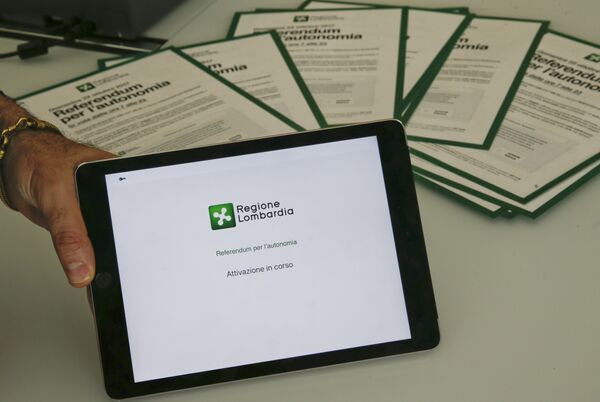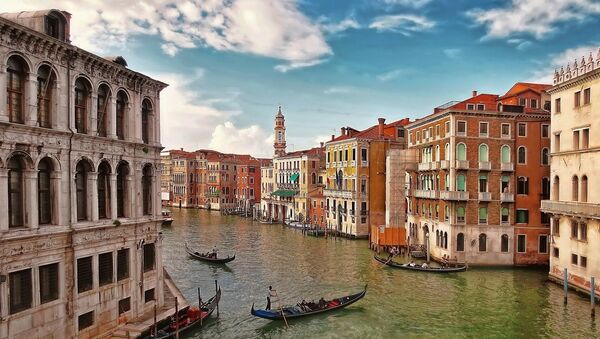People in Veneto — the region surrounding and including Venice — will vote Sunday on whether to get greater autonomous powers from the central Italian government in Rome.

Dr. David Laven, a professor of history at Nottingham University and an expert on the history of Venice since the fall of the Venetian Republic, said the outcome of Sunday's vote would be fascinating.
If voters approved greater autonomy and the Italian parliament rejected it — which it might do for political and economic reasons — according to Dr. Laven, it would "aggravate" the situation, just as the Spanish government's heavy-handedness had boosted Catalan separatism.
"There is a great variety in those supporting the referendum. You saw the same in Catalonia and in Scotland. Those in the Veneto are portrayed in the press as mad right-wingers. That is grossly unfair," Dr. Laven told Sputnik.
#Berlusconi: “In Veneto voteremo Sì con grande convinzione al referendum di domenica 22” #ReferendumAutonomia https://t.co/pXhihbM38q … pic.twitter.com/Io1mhgKAJ2
— AutonomiaVeneto (@AutonomiaVeneta) October 16, 2017
Tweet: "#Berlusconi: "Vote Yes with great conviction In the Veneto in the referendum on Sunday 22"
All Roads Lead to Rome
Dr. Laven said they vary from devout Catholics, who admired the Catholicism of the Venetian Republic, to Greens, who want to reduce the production of Prosecco for environmental reasons.
"Their common enemy is not liking Rome, but their reasons for not liking Rome are very varied," Dr. Laven told Sputnik.
He said that even if the Veneto was to be granted greater autonomy, it would still not be in as strong position as the Scots or the Catalans.
EU: Support for Independence, Katapult poll of polls:
— Europe Elects (@EuropeElects) October 5, 2017
Veneto: 56%
Catalonia: 44%
Sardinia: 41%
Scotland: 40%
Basque: 31%#Catalonia
In 2014, a number of Venetians, who took part in an online referendum on independence for the Veneto, were thrown in jail, accused of sedition, which Dr. Laven described as a "massive overreaction."
But now Rome has finally agreed to a referendum on granting greater autonomy.
Roots of Venetian Nationalism
For hundreds of years, up until 1797, Venice and the Veneto was ruled by the Venetian Republic, which was led by a Doge, who was the "wisest elder."
"Venice was the longest lived republic in history," Dr. Laven told Sputnik.
Veneto was swallowed up by Austria and, after 70 tumultuous years, it finally joined the nascent Italian state in 1866, after a plebiscite, which Dr. Laven said was "rigged."
After joining Italy, the Veneto became the poorest region of northern and central Italy and thousands emigrated to Brazil.
By the 1970s it was one of the wealthiest parts of Italy and many people voted for the Lega Nord, a party which claimed industrious northern Italians were subsidizing southern Italians, which it claimed were workshy and lazy.
Dr. Laven said Italians had never had a strong national identity, despite the efforts of Mussolini in the 1920s and 1930s to manufacture it, and the Veneto was one of those areas which felt its regional identity most strongly.
He said the desire for independence or autonomy had "ebbed and flowed" over the years but had never gone away.
"A lot of people in the Veneto have lost their savings and the government has done nothing about it and more or less let the banks get away with murder. That is one of the things that has pumped in a lot of anger into the situation," Dr. Laven said.
There were a "lunatic fringe" among Venetian nationalists, and Dr. Laven pointed out that in 1997 one group built an armored car and tried to take over St. Mark's Square in an incident which badly damaged the reputation of separatists and autonomists.
But he said there were valid arguments for greater autonomy.
"The Italian state clearly doesn't work, but, then, I am not sure that an independent Venetian state probably would work either," Dr. Laven told Sputnik.



